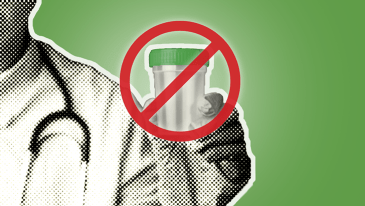Tens of thousands of commercial truckers are leaving their jobs, resulting in higher prices and barren shelves. What’s motivating this mass exodus? Look no further than the federal government’s outdated policies toward marijuana.
Despite the reality that state governments have legalized cannabis use under certain circumstances for the majority of Americans, the federal government still classifies it in the same legal category (Schedule I) as heroin. As a result, commercially licensed truckers are strictly forbidden from consuming cannabis products during their off hours — even if they reside in a state where such use is legal.
Further, federal regulations mandate that truckers routinely undergo random urinalysis screenings for cannabis use. Such tests are not intended to assess for marijuana-induced impairment, but rather, they are designed to detect whether one may have been exposed to cannabis several days, weeks, or even months earlier. That’s because urine screens detect the presence of carboxy-THC — an inert byproduct of cannabis that can remain present in urine for as long as 100 days post-abstinence. Because it possesses such a prolonged detection window, the Justice Department has long acknowledged that a positive test result “does not indicate abuse or addiction; recency, frequency, or amount of use; or impairment.”
Yet, despite these limitations, the federal government has nevertheless remained steadfast in its enforcement of marijuana testing for commercial truckers and for many other federal workers. Predictably, a rising percentage of commercially licensed drivers are failing these tests, and many are walking away from the profession as a result.
According to newly provided statistics compiled by the Federal Motor Carrier Safety Administration’s Drug & Alcohol Clearinghouse, a branch of the U.S. Department of Transportation, over 40,000 commercially licensed truck drivers failed federally mandated drug screens for marijuana in 2022. Since 2020, more than 100,000 truck drivers have tested positive for past cannabis exposure. Of this total, only about 25 percent sought to return to work — resulting in mass driver shortages.
In response to this crisis, Rep. Earl Blumenauer (D-Ore.) last year sent a letter to the Transportation Department calling on the agency to amend its policies that penalize commercially licensed drivers who consume cannabis products while away from the job. It stated: “[Y]our department’s zero-tolerance policy sweeps up drivers who were unimpaired, drivers who have not used cannabis for weeks or even months, and drivers who have used federally-legal CBD oils. Blanket disqualifications are unjust, unfair and cause widespread economic and social damage. Thousands of driving positions are unfilled, compounding our supply chain woes. Penalizing safe drivers who comply with state cannabis laws harms both the drivers and the supply chains they support.”
He’s right. Suspicionless marijuana testing in the workplace is not now, nor has it ever been, an evidence-based policy. Rather, this discriminatory practice is a holdover from the zeitgeist of the 1980s “war on drugs.” But times have changed; attitudes have changed, and in many places, marijuana laws have changed. It is time for workplace policies, and for federal workplace drug testing policies in particular, to adapt to this new reality and to cease punishing employees for activities they engage in during their off-hours that pose no legitimate workplace safety threat.
Several state governments, including New York, as well as major corporations like Amazon, have amended their rules so that most public and private employees may no longer be terminated from their jobs solely because of a positive drug test for the presence of THC metabolites. The federal government should follow suit and amend its own antiquated marijuana testing regulations in accordance with cannabis’ rapidly changing cultural and legal status.
This op-ed originally ran in The Hill on March 10, 2023.











